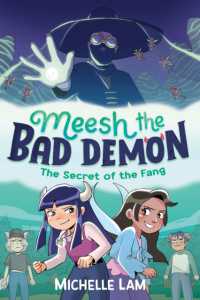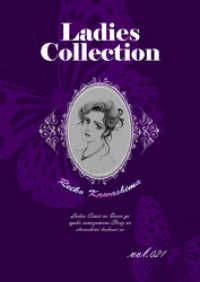- ホーム
- > 洋書
- > 英文書
- > History / World
Full Description
This third volume in the TRAC Themes in Roman Archaeology series offers a new encounter between posthumanism and Roman archaeology. Posthuman theoretical perspectives have had substantial impacts in various fields, including archaeology, critical studies, and feminist studies, but only recently have emerged in the study of the ancient world.
Posthumanism is an umbrella term for a multiplicity of theoretical perspectives that critique humanism, de-centre the human subject, reconsider the boundaries and relations among humans and the natural world, and frame the human condition as non-fixed and variable. Such perspectives also consider the agency of non-humans, their entanglements, interactions, and relations with humans, as well as the ethical implications thereof.
The Romans were entangled with other beings and the world around them: they were relational beings, as we are today. With this volume, the editors aim to explore the potential and utility of posthuman theoretical perspectives for Roman archaeology.
The contributors to this volume consider a diverse array of themes including posthuman performances of emperors, the agency and relationality of epigraphic funerary markers, the ritual function and agency of votive figurines, the materiality of divine agency in the city of Rome, hybrid chicken-human coins, plant agency, the agency and nature of water in Roman urban infrastructure, and the Anthropocene. Collectively, the contributions demonstrate the numerous possibilities posthumanism offers Roman archaeology and reveal the posthuman nature of the Roman world.
Ultimately, the volume stresses that humans and non-humans are entangled and imbricated in larger systems: we are all posthuman.
Contents
I. Irene Selsvold and Lewis Webb (University of Gothenburg, Sweden): Introduction
II. Linnea Åshede (University of Gothenburg, Sweden): Priapus can be anything: Bodies without borders in Roman art.
III. Filippo Carlà-Uhink (PH Heidelberg, Germany): Posthuman ambitions and forms of self-representation in the Roman Principate: The cases of Caligula and Nero.
IV. Vladimir Mihajlovic (University of Novi Sad, Serbia): The agency of Roman funerary monuments: from human to incarnated (biographical) entity?
V. Ariana Zapelloni Pavia (University of Michigan, USA): The materiality of ritual: the use of votive offerings to unravel ancient ritual practices.
VI. Lewis Webb (University of Gothenburg, Sweden): Semiviri vates: Posthuman visions of early Roman encounters with the Galli.
VII. Naomi Sykes and Holly Miller (University of Nottingham, UK): Animals of Empire - the trade, management and cultural meaning of fallow deer.
VIII. Lisa Lodwick (University of Reading/University of Oxford, UK): Exploring plant agency in the Roman world: Plants and people in Roman Britain.
IX. Jay Ingate (University of Kent, UK): Two parts Hydrogen, Oxygen one? Re-evaluating the nature of water in the Roman city.
X. Irene Selsvold (University of Gothenburg, Sweden): Roman archaeology and the Anthropocene.
XI. Oliver Harris (University of Leicester, UK): Closing discussion.







